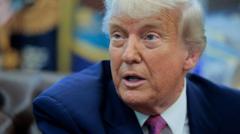Trump's remarks come as Russian bombardments in Ukraine escalate, leading to increased casualties, raising questions about the effectiveness of diplomatic negotiations.
Trump Signals Deadline for Putin on Ukraine Conflict Amid Intensified Attacks

Trump Signals Deadline for Putin on Ukraine Conflict Amid Intensified Attacks
In a recent Oval Office statement, President Trump indicated a two-week deadline for Putin to clarify his intentions regarding the Ukraine war, amidst escalating violence.
In a striking response to the ongoing war in Ukraine, President Donald Trump has set a two-week timeline for Russian President Vladimir Putin to demonstrate whether he is genuinely seeking to end the conflict or merely stalling for time. During a press briefing, Trump conveyed his skepticism about Putin’s commitment, saying, "I'll let you know in about two weeks," reflecting his frustration over the lack of substantial progress in US-Russia negotiations.
As the situation deteriorates, recent Russian air raids resulted in significant casualties in Kyiv, killing at least 13 individuals and injuring many, including children. In light of these unsettling developments, Trump has criticized Putin on social media, describing him as "absolutely crazy" and asserting that the Russian leader is "playing with fire."
Despite intense US diplomatic efforts, including a recent phone call where Trump characterized the dialogue as "very well," results have been lacking. The Kremlin has continued its aggressive military actions, launching extensive missile attacks shortly after the two leaders’ discussions, contradicting the notion of a forthcoming peace agreement.
Trump's frustration is palpable as he grapples with the mediating role of the White House, which has yet to extract meaningful concessions from Russia. The Biden administration has faced criticism for not enforcing stricter penalties against Moscow, even while sanctions remain in place.
In the latest comments reflecting his concern over Putin's unpredictable behavior, Trump remarked on social media that "something has happened" to the Russian president, eliciting a dismissive response from the Kremlin that he lacks sufficient knowledge of the ongoing situation.
As the conflict grimly evolves, international dynamics are shifting, with Germany's Chancellor pledging to assist Ukraine in producing long-range missiles—an act that could exacerbate the existing tensions. Meanwhile, Trump’s negotiation demands have notably softened over time, illustrating the shifting landscape of expectations.
In the long-term context, the war has wreaked havoc on Ukraine, claiming tens of thousands of lives and reducing significant portions of the country to ruins while leaving Moscow in control of around 20% of Ukrainian territory. With delays in the peace process ongoing, Ukrainian President Volodymyr Zelensky has accused Russia of stalling, pointing to the absence of a promised memorandum concerning peace terms.
As the unfolding situation remains precarious, the coming weeks could prove pivotal in shaping the future of US-Russia relations and the fate of Ukraine.
As the situation deteriorates, recent Russian air raids resulted in significant casualties in Kyiv, killing at least 13 individuals and injuring many, including children. In light of these unsettling developments, Trump has criticized Putin on social media, describing him as "absolutely crazy" and asserting that the Russian leader is "playing with fire."
Despite intense US diplomatic efforts, including a recent phone call where Trump characterized the dialogue as "very well," results have been lacking. The Kremlin has continued its aggressive military actions, launching extensive missile attacks shortly after the two leaders’ discussions, contradicting the notion of a forthcoming peace agreement.
Trump's frustration is palpable as he grapples with the mediating role of the White House, which has yet to extract meaningful concessions from Russia. The Biden administration has faced criticism for not enforcing stricter penalties against Moscow, even while sanctions remain in place.
In the latest comments reflecting his concern over Putin's unpredictable behavior, Trump remarked on social media that "something has happened" to the Russian president, eliciting a dismissive response from the Kremlin that he lacks sufficient knowledge of the ongoing situation.
As the conflict grimly evolves, international dynamics are shifting, with Germany's Chancellor pledging to assist Ukraine in producing long-range missiles—an act that could exacerbate the existing tensions. Meanwhile, Trump’s negotiation demands have notably softened over time, illustrating the shifting landscape of expectations.
In the long-term context, the war has wreaked havoc on Ukraine, claiming tens of thousands of lives and reducing significant portions of the country to ruins while leaving Moscow in control of around 20% of Ukrainian territory. With delays in the peace process ongoing, Ukrainian President Volodymyr Zelensky has accused Russia of stalling, pointing to the absence of a promised memorandum concerning peace terms.
As the unfolding situation remains precarious, the coming weeks could prove pivotal in shaping the future of US-Russia relations and the fate of Ukraine.




















